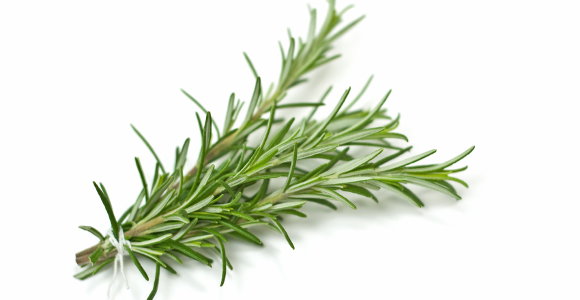Rosemary is one of the most popular herbs for seasoning foods such as beef and pasta dishes. The leaves come from the evergreen shrub Rosmarinus officinalis which is a part of the Lamiaceae family of plants that also includes another popular kitchen herb - mint. The plant is native to the Mediterranean regions of Europe. Less common names for rosemary include compass weed, compass plant, and polar plant.
CaloriesAs with most leafy greens, rosemary is a low-calorie, low fat food. Two teaspoons of the herb provide only seven calories. The majority of the total calories are from carbohydrates sources (1.4 grams), primarily from dietary fiber (0.9 grams, or almost 4 percent of the recommended daily value). Rosemary contains less than one gram each of protein and fat.
Vitamins and MineralsRosemary is a good source of vitamin A (beta-carotene), vitamin B6, vitamin C and folate. The herb is also a good source of several minerals, including calcium, iron, magnesium, manganese, and potassium.
Vitamin A is essential for the formation and maintenance of healthy teeth, skeletal and soft tissue, mucous membranes, and skin. It is also very important for eye health. Beta-carotene, a precursor for vitamin A, is a carotenoid that gives plant foods their color. This antioxidant can protect against damage from free radicals which are believed to play a role in certain diseases and in the degenerative aging process. Rosemary contains 68.80 IU of vitamin A in each serving, or 1.38% of the recommended daily value.
Vitamin B6 is a water soluble vitamin also known as pyridoxine. It is primarily used in protein metabolism and to make hemoglobin, a protein in red blood cells that helps carry oxygen to the body tissues. Rosemary provides 0.04 milligrams of the 1.3 milligrams needed for healthy adults.
Vitamin C is essential for the growth and repair of body tissues and in the optimal functioning of the immune system. Rosemary provides 1.36 milligrams in each 2 teaspoon portion which is a little over 2% of the daily value for adults. The vitamin C in rosemary also helps the body better absorb the non-heme iron content of the herb (0.64 milligrams)
Women, especially those in their child-bearing years, need good sources of folate. Rosemary contributes 6.76 micrograms in each serving which is 1.69% of the daily value. Males and non-pregnant females need 400 micrograms per day, and pregnant and lactating women need between 500 and 600 micrograms daily.
Calcium, magnesium, and manganese are essential minerals for both bone health and cardiovascular health. Rosemary can add 28 milligrams of calcium (2.8% of the daily value), 4.84 milligrams of magnesium (1.2%), and 0.04 milligrams of manganese (2.0%) to the diet.
Other Nutritional CompoundsIn addition to familiar vitamins and minerals, rosemary contains other nutritional compounds that are considered to be highly effective antioxidants. These compounds include rosmarinic acid which has anti-inflammatory and antimicrobial action in addition to being an antioxidant. It has also been used in food preservation to improve the shelf life of foods such as fresh seafood.



